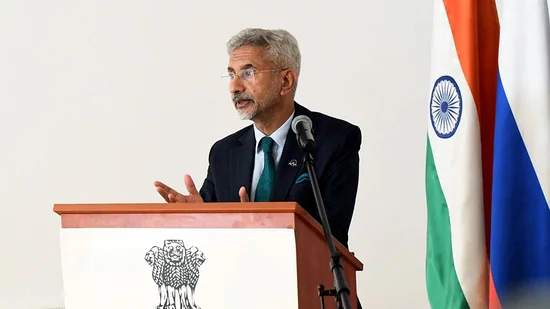It would be a redundancy to introduce S. Jaishankar at this point. The minister who strides and makes foreign tremor in fear (Source: mainstream media), rejoinders sharp enough to cut through pillows and sensual enough to give nationalists orgasms. The man whose utterances carry the effect of 100 Tsar Bombas, to which there is no deterrence.
Ahh, I should stop now. On a serious note, the man is a diplomat in the true sense of the term.
If at this point, I have given the impression that I would be debunking his exploits then Iie Chigaimasu.
Being a purveyor of philosophical inquiry, we will concern ourselves with a certain statement.
”If I had, wouldn’t I be looking at it”
He was in a press conference addressing the issue of a possible interception of documents, asked by a Canadian Journalist. For the context, the press conference happened in the background of geopolitical tensions between India and Canada.
The journalist asks, “So you have not received those intercepted communications?” he replies, “If I had, would I not be looking at it.”
The exchange seems pretty lackluster right? What could there possibly be for a logical analysis? Except, there is.
To learn more about the entire context read: https://www.thehindu.com/news/national/why-have-india-canada-tensions-worsened-explained/article67339026.ece
Material Implication vs Yes or No

The ‘If’ attached to this very statement is called ‘Material Implication’ in logic. It can be denoted by the (⊃) Horseshoe symbol.
For example, ‘If I study hard, I will pass the exam’ can be denoted by ‘S ⊃ E’
Furthermore, the phrase ‘If I study hard’ (denoted by S) is the antecedent of this complex sentence, whereas the phrase ‘I will pass the exam’ ( denoted by E ) is the consequent.
In our mundane lives we love to use Conditional Statements like these and obviously S Jaishankar did as well in this particular episode.
But, there is something about the statements that make them a better alternative to a categorical YES or NO.
Why?
A Yes or a No are not merely used to generate negative or positive responses. It has a logical implication in the sense that when used in common language, they can imply affirming to a whole category (the category of Truth or Falsity, a polarity).
A conditional statement from a logical point of view is concerned with ‘Material Implication’ which means that even if the antecedent is false, the complex sentence as a whole is not false.
Patric Hurley with the help of an example illustrates it in the following way ‘If the temperature rises above 32°F, then the snow will begin to melt’.
‘’ In the first, even though the temperature does not rise above 32°F at any particular moment, the law that governs the melting point of snow holds true. In other words, the statement (which expresses this law) is true regardless of the truth value of the antecedent’’
Want to know more about truth functionality in logic? Read: DHRUV RATHEE, RAMAYANA AND LOGIC: How logic is misunderstood
The case of S. Jaishankar and Truth values

When S Jaishankar said that if he had, would he not be looking at it is a diplomatic statement not because of the context but because of ‘what is implied’. This implicature is one of the key ingredients of diplomatic interactions.
Whether the phrase ‘If I had’ is true or not doesn’t impact the truth value of the entire sentence, preventing his excursion into a diplomatic frenzy.
Furthermore, admitting something as true is as rigid as any objective law. However, for a conditional statement there are four possible configurations or cases in which antecedent and consequent have different values.
| S | E | S⊃E |
|---|---|---|
| True | True | True |
| True | False | False |
| False | True | True |
| False | False | True |
The reason? Well, it is something I would enjoin you to figure out for yourself. Call it lazy antics amidst a seemingly academic prose? Perhaps.
What I shall indeed feed to you is the fact that the way we use certain words in a language to make sense, transcend common sense, entering a realm of logical operations. This is not to say that we should all set our eyes on bringing such operations, but sometimes logic can act as a tool to save you in matters where ‘utterance can be evidence’.


Dear Website Owner,
I hope this email finds you well. I recently discovered your website and was impressed by the quality of your content and the helpful information you offer to your audience. In light of this, I would like to propose a backlink exchange that could benefit both our websites.
My website, https://m.cheapestdigitalbooks.com/, is focused on providing affordable digital books to readers around the world. We currently have a strong online presence with a Domain Authority (DA) of 13, a Page Authority (PA) of 52, and a Domain Rating (DR) of 78. Our website features 252K backlinks, with 95% of them being dofollow, and has established connections with 5.3K linking websites, with 23% of these being dofollow links.
I believe that a mutually beneficial backlink exchange could be of great value for both of our websites, as it may lead to an increase in website authority and improve our search engine rankings. In this collaboration, I am willing to add backlinks from my website using your desired keywords and anchor texts. In return, I would be grateful if you could include backlinks with my desired keywords and anchor texts on your website.
I kindly request that you visit my website, https://m.cheapestdigitalbooks.com/, to get a sense of the potential benefits this partnership could bring to your site. I am confident that this collaboration will provide a win-win situation for both parties, and I look forward to learning more about your thoughts on this proposal.
Thank you for considering my offer. I am excited about the potential growth this partnership may bring to our websites and am eager to discuss the details further. Please do not hesitate to reach out to me at your convenience.
Best regards,
David E. Smith
Email: david@cheapestdigitalbooks.com
Address: 3367 Hood Avenue, San Diego, CA 92117